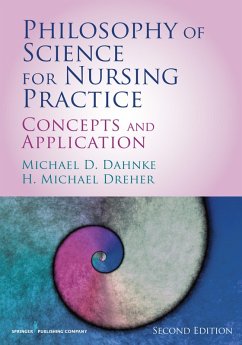Written for DNP and PhD nursing programs, this text, based on a unique team-taught philosophy of science nursing courses, distills challenging content and delivers it in clear, highly accessible language for professors untrained in philosophy and their students. Authored by a nurse researcher/philosopher team who developed and taught this course for more than 7 years, the book provides a unique, integrated viewpoint that avoids esoteric and overly theoretical discussions and facilitates a clear connection between the philosophy of science and nursing science and practice. This second edition offers enhanced clarity and encompasses updates in philosophy of science interpretation, nursing practice and science, and a still-emerging practice epistemology. It is distinguished by its increased emphasis on DNP investigation that relies on a fundamental relationship with evidence-based practice, as well as the informational needs of the PhD student and the type of research the PhD graduate is expected to produce.
The bulk of the text focuses on basic principles and concepts of the philosophy of science in regard to the education of both DNP and PhD nursing students. The book discusses the concept of nursing as a "practice discipline" within historical and sociological contexts, and addresses the importance of philosophy of science knowledge within a practice discipline. It examines the controversial question of how much philosophy of science a doctoral student actually needs. The text concludes with a brief introduction to nursing science knowledge content that is an essential "bridge" to the philosophy of science content and serves as a "next step" toward building a nursing epistemology.
New to the Second Edition:
Key Features:
The bulk of the text focuses on basic principles and concepts of the philosophy of science in regard to the education of both DNP and PhD nursing students. The book discusses the concept of nursing as a "practice discipline" within historical and sociological contexts, and addresses the importance of philosophy of science knowledge within a practice discipline. It examines the controversial question of how much philosophy of science a doctoral student actually needs. The text concludes with a brief introduction to nursing science knowledge content that is an essential "bridge" to the philosophy of science content and serves as a "next step" toward building a nursing epistemology.
New to the Second Edition:
- Revised to enhance clarity of information
- Reflects contemporary trends in doctoral nursing education
- Updated Questions for Reflection offer scholarly discourse
- New appendix offers a sample semester-based syllabus based on the second edition
Key Features:
- Provides concise, accessible information that makes clear connections to practical applications
- Written jointly by a philosopher and a nurse scholar who co-teach the course
- Facilitates student ability to see the real connection between philosophy and practice
- Increased focused content on how philosophy of science content is essential to understand evidence-based and practice-based evidence
Dieser Download kann aus rechtlichen Gründen nur mit Rechnungsadresse in A, D ausgeliefert werden.


